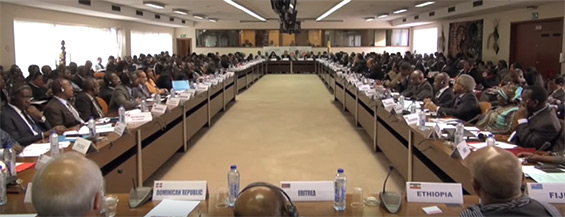ACP Council of Ministers convenes to discuss key development issues

Brussels 20 November 2015/ ACP: The 102nd session of the Council of Ministers of the African, Caribbean and Pacific Group of States convenes next week (23-25 November), bringing together officials from 79 ACP countries to take decisions on key development issues, as well as institutional matters involving the future of the organisation.
Chaired by the Minister of Finance from the Kingdom of Lesotho, Hon. Dr. Mamphono Khaketla, the Council will also welcome the Prime Minister of the Republic of Fiji Hon. Josaia Voreqe Bainimarama, as keynote speaker at the opening ceremony on Tuesday 24th November at the ACP House.
“This Council session takes place at a very critical time, in the midst of major global summits on trade, climate change, and other essential aspects related to development. Moreover, the ACP Group of countries is at a juncture where we must ask fundamental, existential questions about how the organisation can contribute in an effective way that impacts on our peoples’ lives, in light of all the global challenges we face today,” said ACP Secretary General H.E Dr. Patrick I. Gomes. “It is essential to engage strategically during this period.”
Aside from approving the 2016 budget for the ACP Secretariat, major decisions expected out of the meeting include those on the 8th Summit of ACP Heads of State and Government, outlooks on the United Nations Climate Change Conference COP21, the WTO Ministerial conference in Nairobi, amongst others.
Ministers will also hold deliberations on the ACP Small Islands Developing States (SIDS) Forum, and the future of ACP-EU relations.
8th ACP Summit
The Council will consider the offer by the Government of Papua New Guinea to host the 8th Summit of ACP Heads of State and Government on 30 May – 1 June 2016, as well as approve the theme of the Summit. One of the main objectives is for ACP leaders to give clear guidelines on the future of the ACP Group and its reorientation as an international body. These will be particularly based on the recommendations of the Eminent Persons Group (EPG), chaired by the former President of Nigeria, Chief Olusegun Obasanjo, and the Ambassadorial Working Group on Future Perspectives of the ACP Group. A progress report on the work of the EPG will be discussed at the 102nd session.
The ACP Group has been in existence as an intergovernmental organisation since 1975, working primarily with the European Community (later the European Union) in dealing with trade, development cooperation (via the European Development Fund) and political dialogue between EU and ACP countries. As the current partnership with Europe comes to a close in 2020, both sides are reflecting on the nature of the cooperation in the future, particularly in view of new development challenges of the 21st century, geopolitical shifts, and the post-2015 development agenda.
UN Climate Change Conference COP21
Acknowledging that climate change is the single greatest challenge to the sustainable livelihoods, security and well-being of African, Caribbean and Pacific people, the Council will consider an issues paper covering areas of shared interest for ACP countries, in the lead up to the 21st session of the Conference of the Parties to the UN Framework Convention on Climate Change (COP21).
The issues paper reaffirms the view that climate change threatens the very survival of ACP countries, posing immediate and long-term significant risks to sustainable development efforts. It highlights the importance of achieving a legally-binding instrument or outcome applicable to all at the COP21 gathering in Paris, scheduled for 30 November – 11 December, 2015.
Key concerns for ACP countries include adaptation to climate variability and adequate support for adaptation actions especially for LDCs and SIDS; loss and damage associated with impacts of climate change; mitigation and limits on global warming; climate financing; technology development/transfer and capacity building; and reducing emissions from deforestation and forest degradation.
Towards the 10th WTO Ministerial Conference
In trade-related matters, the Council of Ministers will be updated on preparations for the ACP Group’s participation at the 10th WTO Ministerial Conference in Nairobi, Kenya, on 15-18 December. ACP Ministers of Trade recently endorsed a declaration on the MC10 meeting, calling on WTO member countries to reaffirm their commitment to the Doha Development Agenda, in particular on the core areas in the negotiations that are important to developing countries.
In their declaration adopted on 20-21 October, ACP trade ministers urged the WTO to deliver on flexibilities for Least Developed Countries (LDCs) and Small and Vulnerable Economies (SVEs) in agriculture and non-agriculture goods; agreed flexibilities for developing countries in service negotiations; and different tariff reduction targets to be defined for developed countries, developing countries, and SVEs in accordance with the principles of special differentiated treatment and less than full reciprocity.
Programming of the Intra-ACP Envelope
The amount available in the framework of the 11th European Development Fund (2014-2020) for ACP countries is approximately €31.5 billion. Of this, €3.59 billion is allocated for the Intra-ACP envelope, which supports intra-ACP and inter-regional cooperation, finances the joint institutions and bodies, and assists with running the ACP Secretariat.
After two years of processing, the ACP-EU Intra-ACP Strategy Paper will be officially signed on the 26th November, in the margins of the 102nd session of the ACP Council of Ministers. The main programming areas under the Intra-ACP envelope include human and social development (€1.165 billion); climate change, resilience building, and the environment (€475 million); support for private sector development and investment (€600 million) and the African Peace Facility (€900 million), with a further €215 million for institutional support.
For more information, please contact:
Ms. Josephine Latu-Sanft
ACP Press Office, Ave. Georges Henri 451, 1200 Bruxelles
+32 2 7430617
